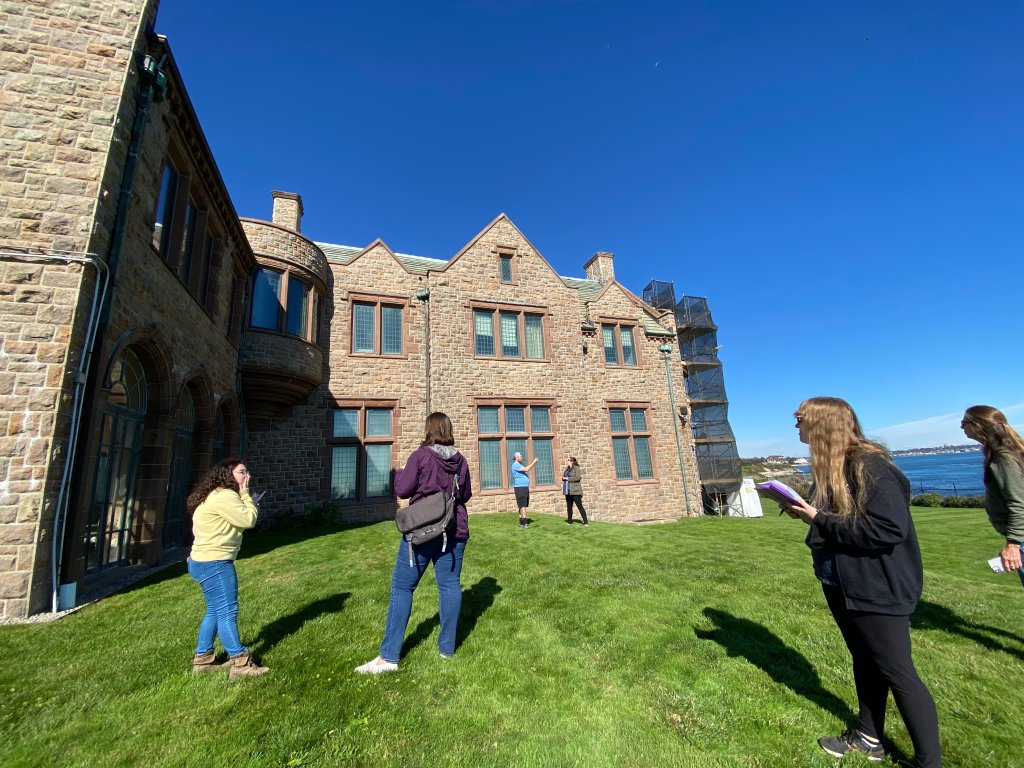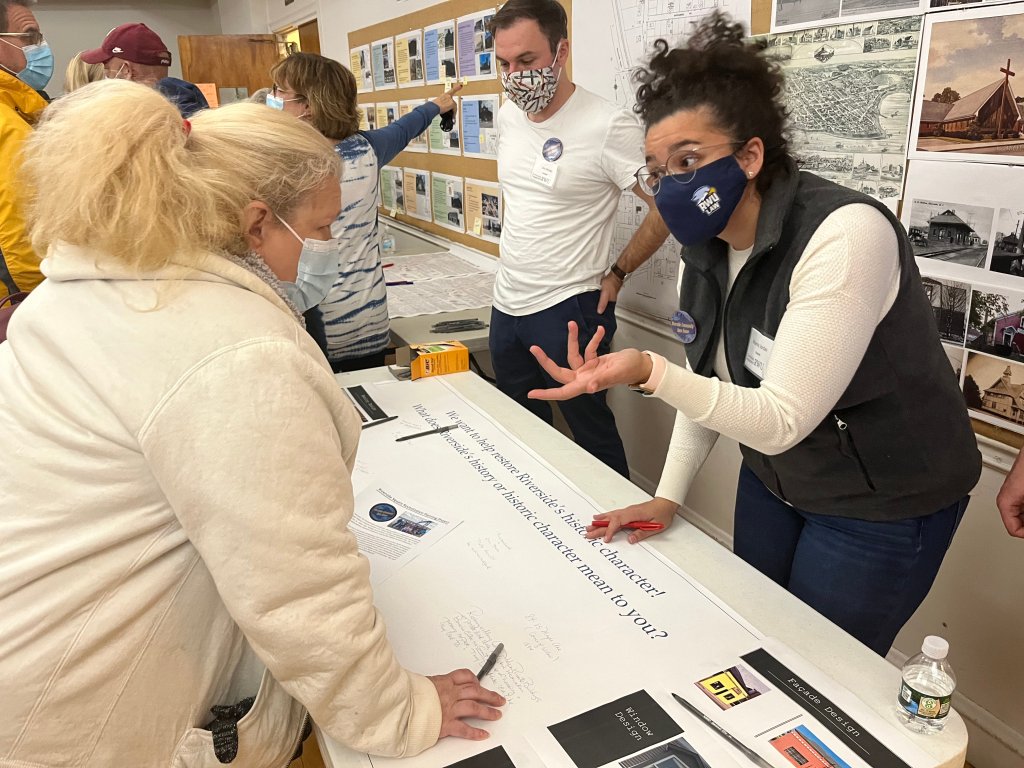Preservation Practices (M.S.)
The M.S. in Preservation Practices program at RWU prepares students for careers stewarding the historic built environment through adaptive reuse, cultural resource management, community and environmental planning, and publicly-engaged history. Housed in the Cummings School of Architecture, the program offers students a lively interdisciplinary environment to explore issues of community revitalization, preservation design, and sustaining cultural heritage.
M.S. Preservation Practices
The Master of Science in Preservation Practices engages students in the fundamentals of cultural resource management, from individual sites to large-scale development and infrastructure projects, and of place- and people-based community planning, revitalization, and redevelopment.
Our Model: Field-Based, Community-Engaged, Interdisciplinary
RWU students participate in the interdisciplinary, team-based work of historic preservation practice through engagement with local municipalities, nonprofits and the private sector on preservation planning and rehabilitation projects through field-based workshops, studios, and a paid internship. Students complete the program with an intensive two-semester sequence of a planning workshop and collaborative studio with design students focused on a major historic rehabilitation or revitalization project. Students may also opt to pursue a thesis under the advisement of program faculty.
What Will You Learn?
.jpg)
Cultural Resource Management and Planning
Examine practices for managing and intervening in the historic built environment as part of environmental and urban planning and design practices. Learn how preservation laws and regulations designate, manage, and affect stewardship of the historic built environment at the federal, state, and local levels.
History of the Built Environment and Cultural Landscape Studies
Gain a strong foundation in the history of the built environment and the dynamics of cultural landscapes through work in the field and in the classroom. Engage in a landscape approach to preservation encompassing consideration of design, technological, historical, and cultural and social significance. Explore the complexity of the historical development of the southern New England region and learn to “read the landscape.”

History, Philosophy, and Ethics of Historic Preservation
Explore changes in the values and ethics of preservation and urban conservation as well as the frameworks for judgements and choices made in preservation projects. Assess practical and ethical issues related to historic preservation such as heritage tourism, governmental and NGO roles, diverse cultural perspectives on the past, and responses to natural disaster and war.
Historic Construction Materials and Methods
Engage with the historic materials, art, and technology of building construction spanning selected culture regions of what is now the United States. Learn how to use historic material to trace the evolution of building activities.
 Historic Building Documentation, Evaluation, and Research Methods
Historic Building Documentation, Evaluation, and Research Methods
Participate in hands-on learning about methods for documenting existing conditions and the historical development of buildings and sites for design, planning, and preservation-related interventions. Learn the skills needed to complete a variety of due diligence and planning documents, including historic structure reports, historic designation or evaluation documentation, and existing conditions reports.
Adaptive Reuse and Revitalization Strategies
Learn about the planning and financial aspects of preserving and rehabilitating historic buildings, public and private financing strategies, place-based revitalization, and issues of shrinking cities, gentrification, and displacement.
Path One provides a continuous sequence from undergraduate to graduate study leading to the Master of Science in Preservation Practices professional degree, for students who have completed Roger Williams University's B.S. in Preservation Studies program. Path One students normally complete this 150-credit sequence in 5 years from the beginning of their undergraduate studies.
Undergraduate Degree Requirements
Required Core
ARCH 101 Foundations of Architecture
ARCH 281 Architectural Analysis I
ARCH 325 History of Modern Architecture
ARCH 327 History of American Architecture, Urbanism, and Landscape
HIST 100 Making Global History
MATH 124 Basic Statistics
PRES 101 Introduction to Preservation Studies
PRES 320 American Cultural Landscapes
PRES 331 Historic Construction Materials and Assemblies
PRES 341 Building and Site Documentation Research Methods
PRES 421 History and Philosophy of Historic Preservation
Required AMST Courses (Choose One)
AMST 370 Topics in Race, Gender, and Sexuality in America
AMST 371 Topics in Ethnicity, Class and Region in America
Required HIST 200 Series (Choose Two)
HIST 240 Colonial and Revolutionary America
HIST 241 Securing the American Republic, 1800-1914
HIST 242 The United States in the American Century
Required Advanced PRES Elective (Choose One)
ARCH 462 The Villa and the Garden
PRES 371 Architecture and Preservation Abroad
PRES 430 Special Topics in Preservation Studies
PRES 471 Museum Studies
PRES 572 Preservation Law and Regulation
PRES 573 Preservation Economics
PRES 430 Special Topics in Preservation Studies
PRES 471 Museum Studies
PRES 572 Preservation Law and Regulation
PRES 573 Preservation Economics
Graduate Degree Requirements
Core Requirements
ARCH 543 Project Development and Finance
ARCH 517 Collaborative Revitalization Studio
PLAN 501 Introduction to Urban and Regional Planning
PRES 501 Fundamentals of Preservation Practice
PRES 532 Building Materials and Technology Workshop
Graduate Electives (Choose five)
ARCH 522 Environmental Design Research
ARCH 524 Evolution of Urban Form
ARCH 529 History of Landscape Architecture
ARCH 530 Special Topics in Architecture
ARCH 577 The Skyscraper
ARCH 593 Sustainable Paradigms
ARCH 594 Urban Ecology
ARCH 561 Landscape Architecture: Theory and Practice
ARCH 572 Urban Design Theory from the Industrial Revolution to the Present
ARCH 573 Modernism in the Non-Western World: A Comparative Perspective
ARCH 574 Regionalism in Architecture
ARCH 575 Contemporary Asian Architecture & Urbanism
ARCH 576 Theoretical Origins of Modernism
PRES 530 Special Topics in Historic Preservation
PRES 571 Museum Studies
PRES 572 Preservation Law and Regulation
PRES 573 Preservation Economics
To read more about our academic offerings, or to view full course descriptions, please refer to our University Catalog.
Path Two
Path Two provides advanced entry to the Master of Science in Preservation Practices degree for students from other universities who have completed a four-year undergraduate degree in Historic Preservation. Individualized placement occurs following an evaluation of the student's undergraduate transcript. Path Two students normally complete a 34-credit, full time sequence over two semesters of study and a summer internship.
Path Three
Path Three provides entry to the Master of Science in Preservation Practices degree for students who have completed a four-year undergraduate degree in fields other than historic preservation. Students normally finish this 53-credit full-time program in two years.
Degree Requirements
Required Core
ARCH 281 Architectural Analysis I
ARCH 543 Project Development and Finance
ARCH 517 Collaborative Revitalization Studio
PLAN 501 Introduction to Urban and Regional Planning
PRES 501 Fundamentals of Preservation Practice
PRES 520 American Cultural Landscapes
PRES 521 History and Philosophy of Historic Preservation
PRES 531 Historic Construction Materials and Assemblies
PRES 532 Building Materials and Technology Workshop
PRES 541 Building and Site Documentation Research Methods
Architectural History Lecture Course (One)
AAH 321 Art and Architecture in the Classical World
AAH 322 Art and Architecture in the Medieval World
AAH 323 Art and Architecture in the Islamic World
AAH 324 Art and Architecture of the Italian Renaissance
ARCH 325 History of Modern Architecture
ARCH 327 History of American Architecture, Urbanism, and Landscape
Architectural History Seminar Course (One)
AAH 530 Special Topics in Art + Architectural History
ARCH 529 History of Landscape Architecture
ARCH 530 Special Topics in Architecture
ARCH 573 Modernism in the Non-Western World: A Comparative Perspective
ARCH 574 Regionalism in Architecture
ARCH 575 Contemporary Asian Architecture & Urbanism
ARCH 577 The Skyscraper
Graduate Electives (Choose up to five)
ARCH 522 Environmental Design Research
ARCH 524 Evolution of Urban Form
ARCH 529 History of Landscape Architecture
ARCH 530 Special Topics in Architecture
ARCH 577 The Skyscraper
ARCH 593 Sustainable Paradigms
ARCH 594 Urban Ecology
ARCH 561 Landscape Architecture: Theory and Practice
ARCH 572 Urban Design Theory from the Industrial Revolution to the Present
ARCH 573 Modernism in the Non-Western World: A Comparative Perspective
ARCH 574 Regionalism in Architecture
ARCH 575 Contemporary Asian Architecture & Urbanism
ARCH 576 Theoretical Origins of Modernism
PRES 530 Special Topics in Historic Preservation
PRES 571 Museum Studies
PRES 572 Preservation Law and Regulation
PRES 573 Preservation Economics
Cultural Resource Survey: Steep Brook - Fall River, MA
Prepared for Fall River Historical Commission in PRES 341/541 Building & Site Documentation and Research Methods
Historic Structures Report: Wind Hill - Bristol, RI
Prepared for Roger Williams University Office of Facilities Management based on work completed in PRES 341/541: Building & Site Documentation and Research Methods
Historic American Building Survey Documentation: Townsend-Greene House - Newport, RI
Prepared for the Newport Restoration Foundation in PRES 341/541 Building & Site Documentation and Research Methods
Adaptive Reuse Feasibility Study: Rochambeau Avenue Fire Station - Providence, RI
Prepared for the Providence Redevelopment Agency in HP 525 Preservation Economics Course
Neighborhood Revitalization Study: Riverside Square - East Providence, RI
Riverside Square Revitalization Assessment in PRES 341/541 Building & Site Documentation and Research Methods
Adaptation Without Loss: Newport’s Point Neighborhood - Newport, RI
Developing Design Solutions and Guidelines for Elevating Historic Buildings in Newport's Point Neighborhood in ARCH 517 Collaborative Revitalization Studio
Reimagining Sacred Spaces: ARCH 517 Collaborative Revitalization Studio - Providence, RI
Sacred Spaces - Preserved, Adapted, Added Onto Rather Than Abandoned in ARCH 517 Collaborative Revitalization Studio
Master's Degree Application Requirements
Applicants to the M.S. Preservation Practices program should submit the following items to the Office of Graduate Admission to be considered for admission. Materials do not have to be submitted together in one package.
- Completed online application form accompanied by the $50 application fee
- Official transcripts of all undergraduate and graduate coursework
- Letter of Intent (two double-spaced pages maximum) describing your interest in the Preservation Practices program, relevant past experiences, and career goals
- Two letters of recommendation attesting to your potential to succeed in graduate school
- Academic writing sample with sources cited employing a conventional style
- If your first language is not English, an official report of TOEFL or IELTS results
Certificate Application Requirements
Applicants to the Preservation Practices Graduate Certificate program should submit the following items to the Office of Graduate Admission to be considered for admission. Materials do not have to be submitted together in one package.
- Completed online application form accompanied by the $50 application fee
- Official transcripts of all undergraduate and graduate coursework
- Letter of Intent (two double-spaced pages maximum) describing your interest in the Preservation Practices program, relevant past experiences, and career goals
- All University required fees
General Information
The Graduate Records Examination (GRE) is not required for admission. International applicants should also read additional requirements for non-U.S. residents.
Where appropriate, documents should be submitted via email to gradadmit@rwu.edu. Any official documents that must be mailed (i.e. transcripts) should be sent directly to:
Office of Graduate Admission
1 Old Ferry Rd.
Bristol, RI 02809
Have questions about the application process? Visit the How to Apply page from the Office of Graduate Admission.
Financial Aid
All accepted Historic Preservation students will be awarded a guaranteed paid assistantship or internship grant through the Career Investment Program. Full-time students will receive $3,000 per year, paid at $18 per hour, and part-time students receive $1,500 per year. Students who fall below full-time status during the year will be pro-rated.
Meet our faculty

Dr. Elaine Stiles
Associate Professor of Historic Preservation and Program Director

Dr. Ginette Wessel
Associate Professor of Architecture

Dr. Gail Fenske
Professor of Architecture
.png)
Alyssa Lozupone
Adjunct Professor of Historic Preservation
Alyssa has served as the Newport Restoration Foundation’s Director of Preservation since May 2019. In this role, she oversees the preservation, stewardship, and property management of the non-profit’s 80 historic buildings in Newport, Middletown, and Portsmouth, Rhode Island. She’s held previous positions at the Connecticut State Historic Preservation Office; The Preservation Society of Newport County; and Roger Williams University’s Cummings School of Architecture, where she’s served as an Adjunct Instructor since 2016. Alyssa currently serves on the Board of Directors at Landmark Trust USA (Dummerston, VT) and Preservation Action (Washington, D.C.). She holds an M.S. in Historic Preservation from the University of Pennsylvania (Philadelphia, PA) and a B.A. in Cultural and Historic Preservation from Salve Regina University (Newport, RI).
Benjamin Haavik
Adjunct Professor of Historic Preservation
Benjamin Haavik is Team Leader for Property Care at Historic New England, where he is responsible for the maintenance and preservation of the organization’s thirty-eight historic house museums and landscapes. Prior to joining Historic New England in 2004, he was deputy director of the Historic House Trust of New York City where he cared for twenty-four historic sites throughout the five boroughs of New York City. Mr. Haavik started his career at the Fairmount Park Historic Preservation Trust in Philadelphia, Pennsylvania, after receiving his M.S. in Historic Preservation from the University of Pennsylvania. In 2004, Mr. Haavik was a participant in the Attingham Summer School Program in England. He is a Professional Associate of the American Institute for Conservation recognized by his peers as being a highly qualified Architectural Conservator.
John Tschirch
Adjunct Professor of Historic Preservation
John Tschirch is an architectural historian, writer, and teacher. His latest books include America’s Eden: Newport Landscapes through the Ages (2022) and Newport: The Artful City (2020), focused on the history of Newport’s urban plan and streetscapes, which received the Victorian Society of America Book Award in 2021. John received his M.A. (1986) in Architectural History and Historic Preservation from the School of Architecture at the University of Virginia. His thirty-year career in the preservation led him on treks across the globe to study historic landmarks and landscapes from Newport “cottages” and Croatian fortresses to Cotswold villages. He currently teaches courses in the history of ornament and design at Rhode Island School of Design and historic preservation at Roger Williams University, and consults on historic preservation projects. From 1986 to 2013 he served as Director of Education and, later, as Director of Museum Affairs and Architectural Historian for the eleven historic house museums and landscapes of the Preservation Society of Newport in Newport, Rhode Island. He has lectured widely in the U.S. and abroad on architecture, landscapes and historic cities, from the Attingham Conference in London to Yale University’s Mellon Center Seminar on 18th Century French Design and the UNESCO sponsored conference on Architecture and Culture in Buenos Aires.

Historic Preservation on St. Thomas
Marjorie Drew, RWU Class of 2019After 19 years as a respiratory therapist, Marjorie Drew ’19 wanted a change. Graduating with a Master of Science in Historic Preservation from RWU, Drew set out in December of 2019 for a new adventure working as a Historic Preservation Specialist for FEMA in St. Thomas, U.S. Virgin Islands.
Read full story
